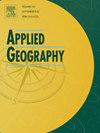国家主导的城市更新能否在没有中产阶级化的情况下实现?
IF 5.4
2区 地球科学
Q1 GEOGRAPHY
引用次数: 0
摘要
在正在进行的全球化和新自由主义浪潮中,城市再生越来越多地与中产阶级化联系在一起。以前的研究强调了国家在重建中的作用及其对中产阶级化的影响日益重要。然而,关于城市更新中不同类型的国家和市场参与与士绅化之间关系的实证研究仍然有限。本研究利用住宅交易和建筑屋顶数据,探讨了上海城市更新与高档化之间的关系。本研究的一个关键新颖之处在于考虑了再生参与者的三种参与类型。在中国,国家主导的复兴逐渐包含了多个目标,超越了纯粹的政府支持的发展模式。令人惊讶的是,仅由政府参与的城市更新并不一定伴随着中产阶级化,而仅由市场或多方(即政府和市场)推动的更新则促进了中产阶级化。这些发现证实,中国的城市发展模式已经发展到一个精细化治理的阶段,在这个阶段,政府可以通过增加对城市更新的参与来缓解士绅化。本文章由计算机程序翻译,如有差异,请以英文原文为准。
Can state-led urban regeneration occur without gentrification?
In the ongoing wave of globalization and neoliberalism, urban regeneration is increasingly linked to gentrification. Previous studies have emphasized the growing importance of the state's role in regeneration and its effect on gentrification. However, empirical research on how different types of state and market involvement in urban regeneration relate to gentrification remains limited. This study investigates the association between urban regeneration and gentrification in Shanghai by utilizing housing transaction and building rooftop data. A key novelty of this study is to consider three involvement types of regeneration actors. The state-led regeneration in China gradually encompasses multiple goals, moving beyond a purely government-sponsored development model. It was surprising to find that urban regeneration with solely government involvement was not necessarily accompanied by gentrification, whereas regeneration driven solely by the market or by multi-actor (i.e., government and market) promoted gentrification. These findings confirmed that China's urban development model has evolved to a phase of refined governance, where gentrification can be mitigated by increasing government involvement in urban regeneration.
求助全文
通过发布文献求助,成功后即可免费获取论文全文。
去求助
来源期刊

Applied Geography
GEOGRAPHY-
CiteScore
8.00
自引率
2.00%
发文量
134
期刊介绍:
Applied Geography is a journal devoted to the publication of research which utilizes geographic approaches (human, physical, nature-society and GIScience) to resolve human problems that have a spatial dimension. These problems may be related to the assessment, management and allocation of the world physical and/or human resources. The underlying rationale of the journal is that only through a clear understanding of the relevant societal, physical, and coupled natural-humans systems can we resolve such problems. Papers are invited on any theme involving the application of geographical theory and methodology in the resolution of human problems.
 求助内容:
求助内容: 应助结果提醒方式:
应助结果提醒方式:


